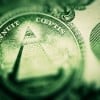Sorry, no content matched your criteria.
Featured Story
The Stronger U.S. Dollar Is Actually Destroying the Markets

The U.S. dollar remains the most important financial instrument in the world. The dollar rally has been the single most decisive factor in determining economic growth (or weakness) and market direction since early 2014.
Right now, that’s not a good thing. A stronger dollar has a far-reaching, negative domino effect that pressures global markets in all directions.
The U.S. dollar remains the most important financial instrument in the world. The dollar rally has been the single most decisive factor in determining economic growth (or weakness) and market direction since early 2014.
Right now, that’s not a good thing. A stronger dollar has a far-reaching, negative domino effect that pressures global markets in all directions.
